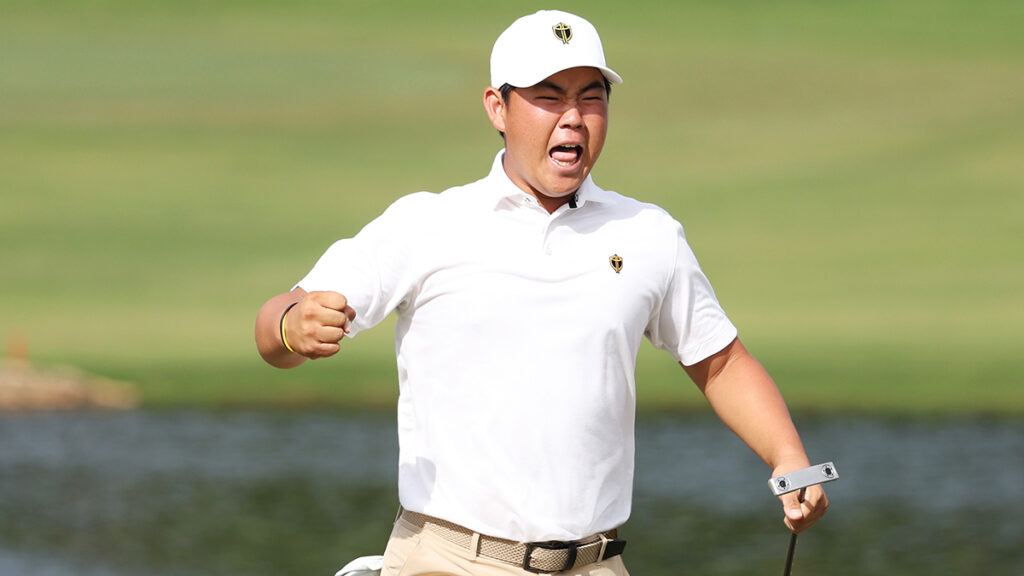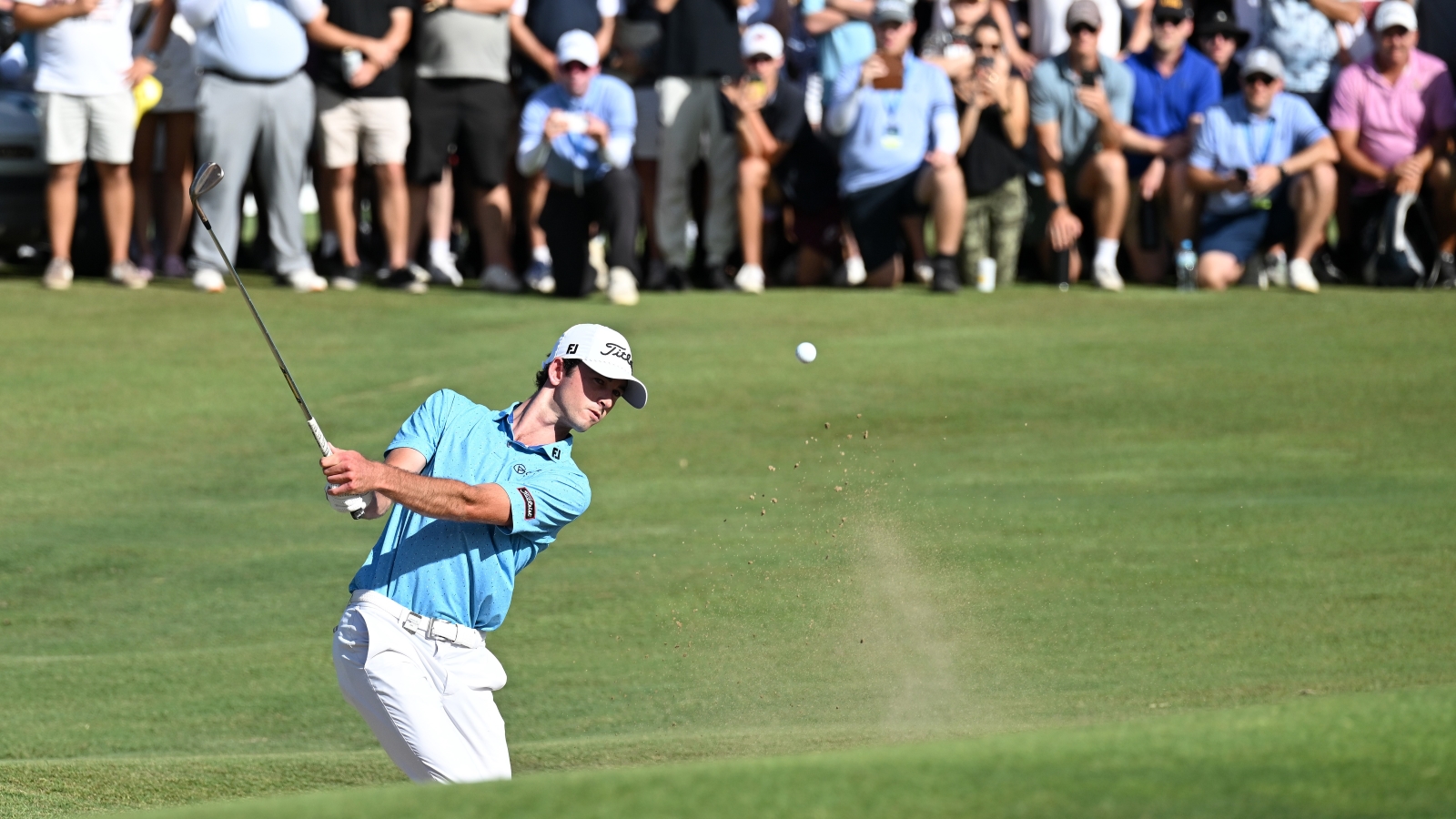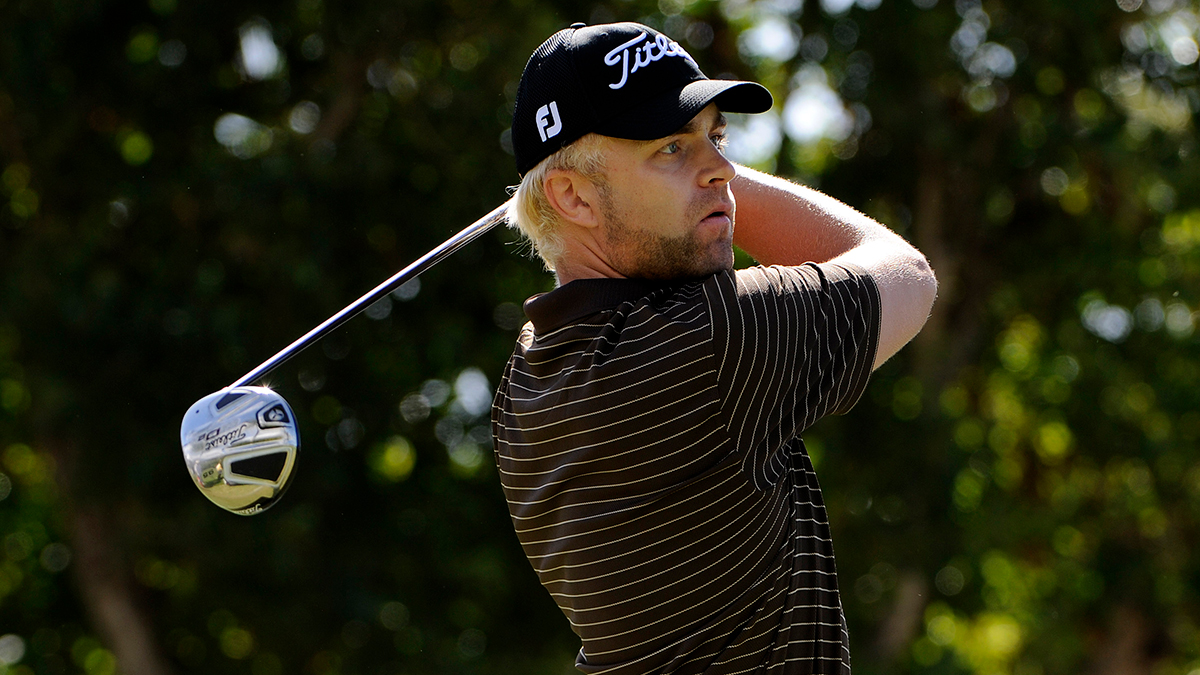Tom Kim Dreams Big – Australian Golf Digest

- by Admin
- November 26, 2024

What to wish for when your only dream comes true
Photographs by Justin Bettman
A thousand years ago, in 2022, Tom Kim sat in the audience while Rory McIlroy held court with
reporters before the CJ Cup in South Carolina. Kim raised his hand for the microphone and joined the ranks of the inquisitors. “What’s it like,” he said, “having so much success as a young player? How do you manage all that?” Kim was 20 years old at the time, and he had won his second PGA Tour event, the Shriners Children’s Open in Las Vegas, only two weeks before. He had started to feel the dizziness that comes with heights and needed someone to steady him.
McIlroy smiled from the front of the room. “I didn’t have as much success as you’re having from such a young age,” he said. Kim laughed. Then McIlroy turned serious. “The biggest thing I realised is managing your time,” he said. “You’re going to be pulled in so many different directions.” McIlroy looked down at Kim and started counting out loud. “One, two, three, four… I can see five sponsors on you,” he said. McIlroy warned Kim not to lose sight of what really mattered. What had made him a two-time winner at such a precocious age? “It’s the time that you put into it,” McIlroy said.
As of this writing in 2024, Kim is a three-time PGA Tour winner, having claimed the Shriners again in October 2023. He was 21 years, three months and 24 days old when he lifted the trophy, making him the youngest to raise three since Tiger Woods.
Seeing Kim slumped on a couch at his home in Dallas, that’s where the similarities seem to end. He has been left a little flat by a cold. His parents sit nearby, discreet in their perpetual availability. He hit the gym with Scottie Scheffler this morning, but he hasn’t swung a club today, a rarity. He probably won’t. “It’s ballsy cold,” he says. “It’s so cold.” Instead, he’ll work on his mental game. For the next hour at least, that means thinking about what McIlroy told him. It means thinking about time.
He bristles at the idea that his rise has been meteoric. “People think I came out of nowhere,” he says. “That’s not true.” He turned professional when he was 15 years old. He was born in South Korea – his father, Changik, was a former professional and coach – but Kim’s first tour was in the Philippines. He moved on to the Asian Development Tour, the Korean Tour, the Asian Tour. Because of his age, his parents travelled with him, watching from behind the ropes while he won tournaments in Malaysia, India and Singapore. His family’s fortunes rose and fell with him.
“Tom has battled for his livelihood since he was 15,” his older brother Sam says. “Golf was the only opportunity that he had. For him, growing up, every tournament counted. Every shot mattered.”
He yearned to come to America all the while. (Even his accent is a testament to his single-mindedness. The Kim brothers perfected their English during an extended family sojourn to Australia. Sam, a business major at Georgetown University, has an Aussie accent. Tom sounds Californian.) It took Kim five years to make his dream come true. That might not seem like a long time, but numbers are never as absolute as they seem. They are framed by perspective, given meaning by context. For Kim, five years is a quarter of his lifetime. Five years felt like forever.
“You’re at this age when there are so many things you want to experience, but you’re not experiencing them because you have a job to do,” he says. “You realise that this is the most important thing, and that’s all you see – you’re just running towards that one dream – and when it happened it was like, I’ve been working my whole life for this.”
Which means that now that he has arrived, Tom Kim isn’t in a hurry anymore. It’s one of the reasons he chose Dallas as his stateside home. Life in Seoul can be frenetic. A short commute can be harrowing. The pace is different in Texas. There seems to be more of everything, including hours in a day and days in a week. “I just try to live a very quiet life,” Kim says. “I’m enjoying just trying to live easy.”
He is an unusual 21-year-old in many ways. Maybe what makes him most special is his desire to slow down.
A younger Kim thought only of the future.
He made plans. It proved instructive when his plans didn’t come to fruition, and his life worked out better than he had imagined.
He thought his path to the United States was the Korn Ferry Tour; he saw a logic in climbing golf’s built-in ladder. In 2021, he reached the second stage of Korn Ferry Q-School at Bear Creek in California. He needed to make an eight-foot putt on the last hole to advance to the final stage, guaranteeing him conditional status. He would become a grinder at least, lifting his game to domestic demands and perhaps finding his way to the PGA Tour. No matter what, he would finally call America home.
He missed the putt.
“It felt like my life was over,” he says. “It was that kind of feel.”
He returned to Asia and did his best with what was in front of him, winning the Korean Tour Order of Merit. He won the Asian Tour Order of Merit, too. That got him into some serious tournaments for 2022: the US Open and the Open Championship, the Byron Nelson and the Genesis Scottish Open, where he finished third. He also made the cut at both Opens and joined the PGA Tour as a special temporary member after finishing seventh at the Rocket Mortgage Classic.
That August, he won the Wyndham Championship. He was the first tour winner born after 2000, and then he won again, and again. He traded his birth name, Joohyung, for his childhood nickname – born of his love of Thomas the Tank Engine – made Dallas his American home, and enjoyed a star-making turn at the 2022 Presidents Cup. “He’s been such a tremendous gift for our sport,” International captain Trevor Immelman said of him at the time. “Man, I am a huge fan.”
Immelman was not alone. Kim’s buoyant presence gained him as much notice as his game. “He’s been awesome,” teammate Cameron Davis said. “Really positive – really high energy, which I think is great.” His roars, fist pumps and heart thumps became a personal signature. He had been working on those since childhood, too. Sam Kim remembers his little brother mimicking the fist pump Woods unleashed after the putt that earned him a playoff against Rocco Mediate at the 2008 US Open. Tom was 5 years old.

Afterwards, Kim admitted that his putting routine included deciding how he would celebrate the putt he was about to make. Not many golfers would confess that, but his compelling mix of drive and innocence, of savvy and guilelessness, somehow works for him. He is a home-schooled golf obsessive, but he’s funny and unabashed, regularly straying delightfully off-script. Chad Mumm, executive producer of “Full Swing”, Netflix’s inside-the-ropes golf series, watched Kim’s Presidents Cup display and gave him an episode this season because of his rare heart: it’s so big; he can’t help but wear it on
his sleeve.
“Everybody fell in love with Tom,” Mumm says. “A lot of these guys are very protected and cloistered by virtue of their talent. He’s living his dream in the biggest way possible.”
There are moments when Kim can seem like an id-driven maniac. He split his pants twice at the Presidents Cup. (“The pants were just crap,” he says. “They were terrible pants.”) Trying to track down a wayward shot at the PGA Championship, he wound up hip-deep in mud. (“Like, I would do that all over again just to find that ball.”) Next, he raised eyebrows along with his cuff line when he played at the St Jude Championship with his pants rolled up, stretched over the pot roasts he calls calves. (“I didn’t want to get my pants dirty. Might as well roll them up.”)
Then he’ll make a turn, and he’ll do or say something that will remind you that he’s younger than most top amateurs. “He’s sacrificed a lot to be where he is,” Sam Kim says. “He’s still learning how to be an adult.” It was widely reported that Kim’s 21st birthday party was his first party – the first time he had been in the company of people other than his family to celebrate something.
“No, that’s not true at all,” he says.
Oh, when was his first party?
“It was at the Presidents Cup. That was my first official party.”
So now Tom Kim has been to two parties, one for each pair of pants he has destroyed. He has also climbed as high as 11th in the world golf ranking, a multicultural force of nature, poised to become the game’s next global superstar.
“It all started with that missed putt at Bear Creek,” he says.
The lesson? Sometimes it’s not up to you how things happen. Only so much of your fate is within your control. Take what life and the game gives you and make the most of it.
Kim nods. “Exactly,” he says.
Sinking a little more deeply into his couch, Kim seems happy for the reinforcement. It might sound strange given his success, but 2023 was something of an off year for him. “It was humbling,” he says. “I left so much out there.” In retrospect, when he had asked McIlroy about how he had dealt with his own early triumphs, Kim was exposing a looming fragility. He had never been one to hide his feelings or his ambitions. Now he was confessing a new uncertainty about both: what do you wish for when your only wish comes true?
“You’re never going to be able to train for when your success comes,” Kim says. He revels in the company of more experienced golfers, partly for the camaraderie but also for the wisdom. He spent last Christmas with Jordan Spieth and his young family – “I think they’re so close in age, it actually makes it nice,” Spieth said afterwards, comparing Kim with his toddler son Sammy – and Scheffler is another close friend. (Full Swing’s cameras caught a beautifully typical Tom Kim moment in Augusta where, after he had missed the turn for Magnolia Lane, he parked in a spot reserved for former Masters champions, and Scheffler, among their number, delighted in pointing it out. “Oh, God!” Kim said before recovering his pride. “All right, winner. I’m gonna get out of your parking spot.”)

He has asked his indulgent colleagues for advice on everything from how to play certain lies to how to sleep on an overnight lead in a major. “Those guys have been a huge help,” Kim says. He thought he had followed enough of their lead. He signed with Nike, and now his jumpers have one logo instead of five. But preparation will carry you only so far. There’s a difference between expectation and reality, and Kim started to lose himself when he began to win. “Instead of going into 2023 just trying to get better, I was thinking, I want to win this, and I want to win that,” he says, “which is not the way I normally do it. My mindset shifted a little, and it’s been really eye-opening about who I really am and what works for me. I learned a lot about myself.”
Kim’s soul doesn’t match his vessel, and neither does his game. With his robust build and self-confessed appetites – “I’m a big meat guy,” he says – he looks like he should be a huge swinger, a bomber. He’s almost shockingly average off the tee, but he’s straight. “I’m just a 172-ball-speed guy who tries to hit a lot of fairways,” he says. His long irons are his standouts, which he uses to catch up to the longer drivers. (His signature shot at the 2022 Presidents Cup was a 2-iron he laced from 219 metres to eight feet.) He competes whenever his putter gets hot.
“I feel like once you get to the PGA Tour, everyone knows how to make birdies,” he says. “It comes down to who can make the fewest mistakes. Just how can you be in there?”
His finishes this year have been mostly underwhelming because his putting has been below his standards, particularly in the should-make-but-can-miss range. It’s a surprising development given his allegiance to precision. It’s also no reason to panic. Chris Como, his swing coach, has reminded him to think more about his process than his results – the key to Woods’ success, according to Como – and Kim is heading into 2025 in a measured frame of mind. It isn’t time alone he’s trying to stop; he’s trying to hold himself back.
There isn’t anything Earth-shattering about that approach. A lot of golfers talk about playing within themselves, especially when they’re trying to recapture past success. There is still something inspiring about Kim’s zeal for restraint. Buzz Aldrin talked about courage being an accumulation of discipline: you make small, steady steps towards weightlessness until one day you’re strapped on top of a rocket. Tom Kim is golf’s version of an extreme gradualist, a testament to the efficacy of micro-gains.
“He’s always thinking about golf,” Sam Kim says. “He’s always thinking about how to get a little better compared to yesterday. He’s always thinking about how he can improve the system that he has.” Golf Digest asked Tom Kim to share more about that system. Politely, if unusually, he declined, citing fear of losing his competitive advantage, as though he had been asked to give away his rights to a patent. Kim’s system isn’t trademarked, but he believes it, like his approach to the game, is his and his alone.
Take his length off the tee. When he hit that famous 2-iron, he was nearly 60 metres short of his American foes. Does he feel pressure to drive further? “No, not at all,” he says. Last year, he gained seven miles per hour in his ball speed, mostly by getting stronger physically. Sometimes he felt like he was overswinging – with distance came wildness, or what passed as wildness for him – and he has toggled things back to 172. Now the goal is to add a mile per hour per year.

“Then I’ll be 180 by the time I’m 28, 29,” he says. “That’s probably when my prime is going to come. I’m very old-school. I know what’s good for my game. If someone could give me 185 tomorrow, would I take it? Yes, of course. But it doesn’t work that way. I have to go out and earn it. If I play worse with 185, there’s no point. That’s the beauty of this game. I just love how detailed you need to be.”
McIlroy told him something else at the CJ Cup that made an impression: it was easier for him to become the best golfer in the world than stay the best golfer in the world. Spieth’s own dramatic arrival at 20 and his volatile career since is proof of the fickle nature of greatness. There’s nothing wrong with thinking big. Every miracle begins with the vision of it. “Of course, you want to win,” Kim says. “It would be great to win one or five or 10 majors.” But he knows that monuments have foundations in bedrock. The best-built parts of them are the parts that no one can see.
Kim might resist wins as a measure. It’s still hard not to wonder what might be in store for him. Maybe, just this once, we should fight the urge to future cast. Maybe we shouldn’t saddle an emerging golfer with the weight of expectation, measuring him against the best of the best. Maybe we should remember that there are metrics other than trophies. “Not losing yourself – not forgetting what brought you here, that grit, hunger, determination – that’s the most important thing,” Kim says. His tie for second at last year’s Open Championship, after he blew up his ankle tripping over a patio stone, was reminder enough. Maybe we should be happy to watch him go about his small, almost imperceptible work, finding something to admire in a young man’s pursuit of increments rather than absolutes.
Kim thinks he’s down to the final one percent of his efforts – that’s the margin between his game, as it exists today, and the games of the elite, the golfers who compete in most majors, who routinely win multiple times each year. He isn’t starry-eyed about the company he’s suddenly keeping. Asked to describe his first practice round at Augusta last year, when he was out for three hours with Woods and McIlroy, he at least feigned nonchalance: “a nice, enjoyable round”, he called it. But he has been watching them as closely as the world has started to watch him. At golf’s most rarified levels, the margins become almost impossibly fine. Not much separates the very good from the great, and the opportunities for self-improvement are limited. Kim shot a 61 to close out his win at the Wyndham. Some rounds, it’s hard to find the strokes to shave. He has found them, though. By his lights, they are all around him. They are all around us.
“You make a nice six-footer for par, that’s one of those strokes,” he says. “You make one birdie from 80 yards, that’s another. Instead of the numbers, you need to see what you can do compared to the guys who win by a lot. The difference might come down to half a shot a day.”
Half a shot a day. A mile per hour per year. Let those tiny achievements add themselves up, and one day you’re walking on the moon. It’s a beautiful way to think. The shame is that not many young men think that way. They think in big swings. They think in right now when they have all the time in the world. When Kim thinks of his competitive career in its entirety, he thinks about how long it might be. “I’m only 22,” he says. “I still have a lot of years of golf in me. I have one more lifespan than I’ve lived.” Take everything he has ever done since the day he was born, every improvement he has ever made, every inch of progress, and double it.
Tom Kim will be 44 years old.
The Latest News
-
November 26, 2024Indian apparel exporters expecting more business from Australia | Trade Data News Bangladesh
-
November 26, 2024News You May Have Missed: December 2024 – Australian Golf Digest
-
November 26, 2024The numbers leading up to Australia’s Perth capitulation
-
November 26, 2024‘Enshittification’: Australian Dictionary’s Word Of The Year, What It Means
-
November 26, 2024PGA Australia: Purpose And Passion – Australian Golf Digest




